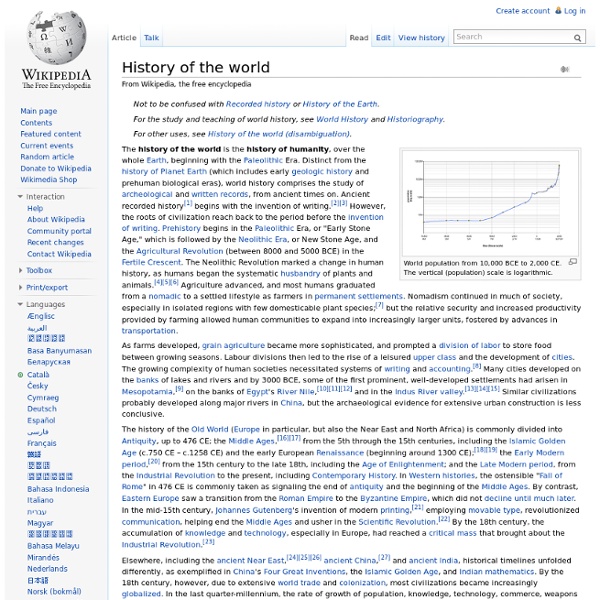Ancient Greece
The Parthenon, a temple dedicated to Athena, located on the Acropolis in Athens, is one of the most representative symbols of the culture and sophistication of the ancient Greeks. Ancient Greece was a Greek civilization belonging to a period of Greek history that lasted from the Archaic period of the 8th to 6th centuries BC to the end of antiquity (ca. 600 AD). Immediately following this period was the beginning of the Early Middle Ages and the Byzantine era.[1] Included in ancient Greece is the period of Classical Greece, which flourished during the 5th to 4th centuries BC. Classical Greece began with the repelling of a Persian invasion by Athenian leadership. Classical Greek culture, especially philosophy, had a powerful influence on the Roman Empire, which carried a version of it to many parts of the Mediterranean Basin and Europe, for which reason Classical Greece is generally considered to be the seminal culture which provided the foundation of modern Western culture.[2][3][4][5]
Middle Ages
In European history, the Middle Ages, or Medieval period, lasted from the 5th to the 15th century. It began with the collapse of the Western Roman Empire and merged into the Renaissance and the Age of Discovery. The Middle Ages is the middle period of the three traditional divisions of Western history: Antiquity, Medieval period, and Modern period. The Medieval period is itself subdivided into the Early, the High, and the Late Middle Ages. Depopulation, deurbanisation, invasion, and movement of peoples, which had begun in Late Antiquity, continued in the Early Middle Ages. During the High Middle Ages, which began after AD 1000, the population of Europe increased greatly as technological and agricultural innovations allowed trade to flourish and the Medieval Warm Period climate change allowed crop yields to increase. Etymology and periodisation[edit] Later Roman Empire[edit] Map of the approximate political boundaries in Europe around 450 Early Middle Ages[edit] New societies[edit]
MacroHistory : World History
History of the alphabet
The history of alphabetic writing goes back to the consonantal writing system used for Semitic languages in the Levant in the 2nd millennium B.C. Most or nearly all alphabetic scripts used throughout the world today ultimately go back to this Semitic proto-alphabet.[1] Its first origins can be traced back to a Proto-Sinaitic script developed in Ancient Egypt to represent the language of Semitic-speaking workers in Egypt. This script was partly influenced by the older Egyptian hieratic, a cursive script related to Egyptian hieroglyphs.[2][3] Mainly through Phoenician and Aramaic, two closely related members of the Semitic family of scripts that were in use during the early first millennium BC, the Semitic alphabet became the ancestor of multiple writing systems across the Middle East, Europe, northern Africa and South Asia. Pre-history[edit] Two scripts are well attested from before the end of the fourth millennium BCE: Mesopotamian cuneiform and Egyptian hieroglyphs. Predecessors[edit]
Dark Ages (historiography)
The Dark Ages is a historical periodization used originally for the Middle Ages, which emphasizes the cultural and economic deterioration that supposedly occurred in Western Europe following the decline of the Roman Empire.[1][2] The label employs traditional light-versus-darkness imagery to contrast the "darkness" of the period with earlier and later periods of "light".[3] The period is characterized by a relative scarcity of historical and other written records at least for some areas of Europe, rendering it obscure to historians. The term "Dark Age" derives from the Latin saeculum obscurum, originally applied by Caesar Baronius in 1602 to a tumultuous period in the 10th and 11th centuries.[4] The term "Dark Ages" originally was intended to denote the entire period between the fall of Rome and the Renaissance; the term "Middle Ages" has a similar motivation, implying an intermediate period between Classical Antiquity and the Modern era.
Ancient Digger Archaeology
Alphabet
The letters in the Greek alphabet presented below are used for printed Ancient Greek texts. The earliest Greek texts that have survived were written with a radically different script called Linear B. For a detailed and wonderfully well argued discussion of the origins of the Greek alphabet, see Roger D. Woodard’s book, Greek Writing from Knossos to Homer. You can find fonts for displaying or writing Greek text as well as utilities for converting older fonts to the new Unicode standarde on our fonts page. Three sets of pronunciation suggestions are given in the table below: first the pronunciation of each letter in Modern Greek, then the reconstructed Hellenistic Koine pronunciation, and finally the reconstructed pronunciation for the Classical period (before about 350 BCE). The Erasmian pronunciation used in many schools to teach Biblical Greek and sometimes even Classical Greek is not given on this page. Modern th as in then (but not thin. Modern th as in thin, but not in then. Roger D.
Crusades
The Crusades were military campaigns sanctioned by the Latin Roman Catholic Church during the High Middle Ages through to the end of the Late Middle Ages. In 1095 Pope Urban II proclaimed the first crusade, with the stated goal of restoring Christian access to the holy places in and near Jerusalem. Many historians and some of those involved at the time, like Saint Bernard of Clairvaux, give equal precedence to other papal-sanctioned military campaigns undertaken for a variety of religious, economic, and political reasons, such as the Albigensian Crusade, the Aragonese Crusade, the Reconquista, and the Northern Crusades.[1] Following the first crusade there was an intermittent 200-year struggle for control of the Holy Land, with six more major crusades and numerous minor ones. In 1291, the conflict ended in failure with the fall of the last Christian stronghold in the Holy Land at Acre, after which Roman Catholic Europe mounted no further coherent response in the east. Terminology[edit]



